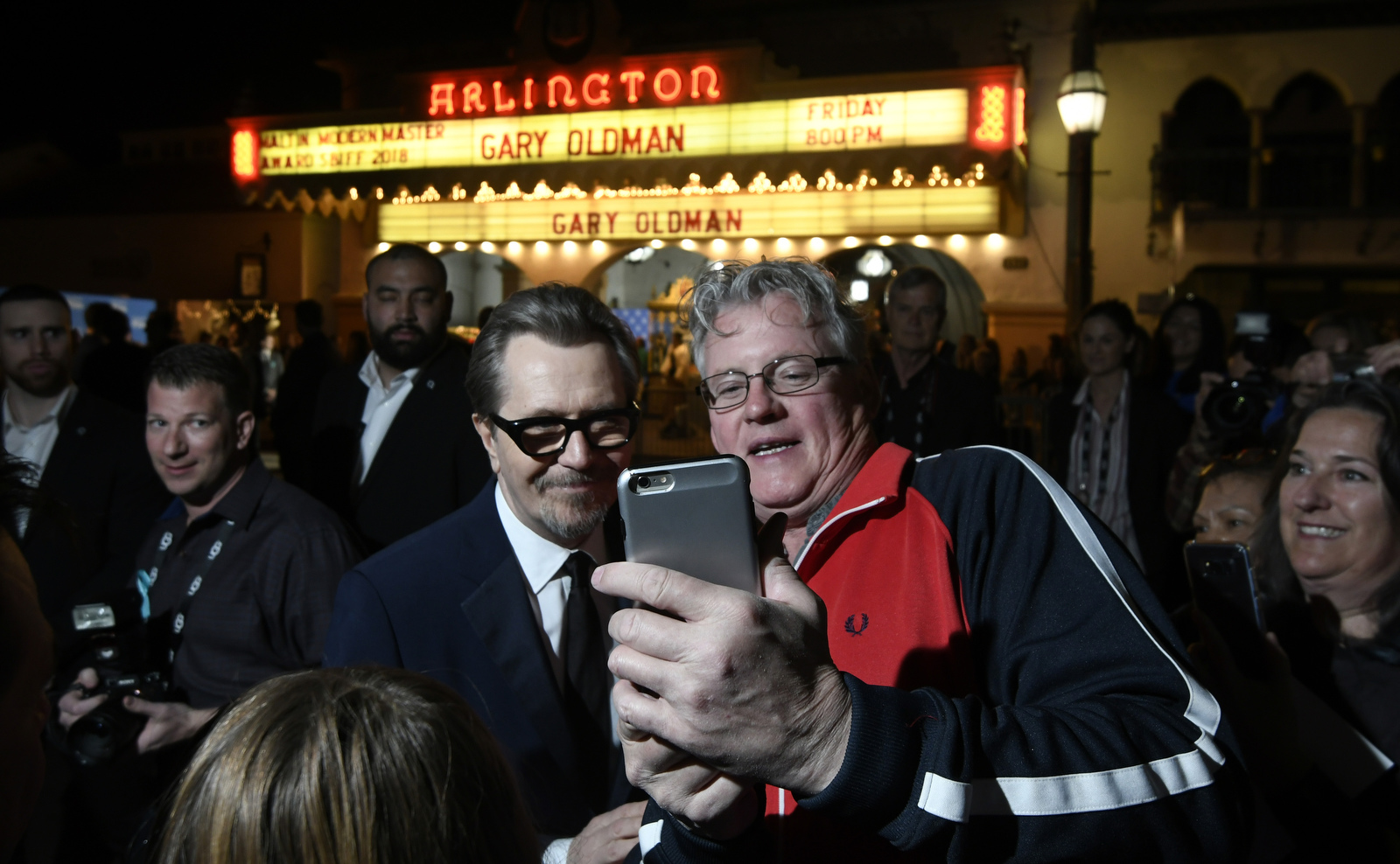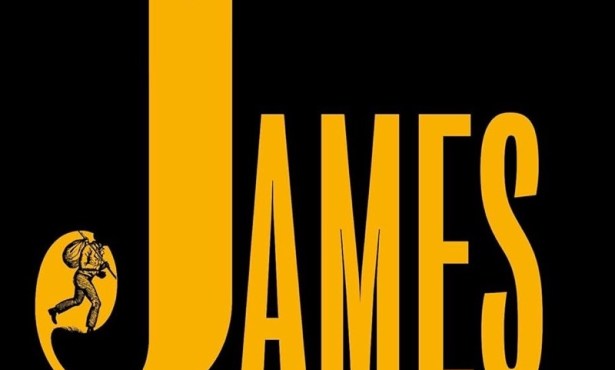SBIFF 2018: Day Three
Immortal Chameleon

By the time last night’s Gary Oldman tribute rolled around to the subject of Winston Churchill, we were fully aware that we were in the presence of a true acting chameleon. Oldman is one of those characters — make that a truckload of characters — in cinema who have so fully gotten “into character” that we can forget the remarkable range of his work. Of course, he’s wallowing in the heaping kudos for his magical transformation into Winton Churchill in The Darkest Hour, but this is also the actor who has played, with brio and depth, Sid Vicious (a very different British icon, or anti-icon), Dracula, Beethoven, in a young Stephen Frears’s brilliant Prick Up Your Ears, the sleek spy number Tinker, Tailor, Soldier, Spy, and too many more to mention. Other actors build their brand by putting their individual stamp on their work: Oldman understands the time-honored thespian challenge of suspending self and achieving full envelopment in a role, begging the question “Will the real Oldman please stand up?”
The real Oldman, in the flesh (thought not as much flesh as his Churchill) stood up — well, sat down — at the Arlington for his “this is your life” night in the spotlight for the SBIFF’s Maltin Modern Master Award, reeling through a long list of clips (but still missing some important ones, due to the breadth of the Oldman filmography), and speaking in his soft, thoughtful, and well-spoken way.
He talked of the turning point in his life and career when he went viral/commercial, landing in the lucrative Harry Potter and The Dark Knight series. Preceding his entry into that stratosphere, the actor was a single father raising two sons in an apartment in L.A., and he made the decree that, “I want to make the most money for the least amount of work.” That may sound like the mantra of a sell-out, but was, in fact, the mandate of a father wanting to spend more time with his family.
Speaking about The Darkest Hour is his current primary task in life, caught up in the flurrying fury of pre-Awards season promotional touring, of which this evening was a more dignified part. He pithily touched on an essence of the film, saying, “Not to get mystical or weird about it, but I felt [Churchill] was with us. He was cheering us on.” Now come the roaring cheers of critics, crowds, and the Gods of Oscar.
Oldman received his Maltin-ized trophy from fellow actor from The Darkest Hour, Ben Mendelsohn (“I’ve been awarded by the King of England,” Oldman quipped), and was gracious in an acceptance that thanked the proverbial Academy (aka SBIFF), the force of good fortune in his life and career, and even went easy on critics (although he did paraphrase an old Kenneth Tynan axiom: “Critics know the direction but they can’t drive the car,” a variation on the description of critics as “eunuchs at an orgy”). His graciousness extended to the end, as he acknowledged and extended compassion to Santa Barbara’s “terrible series of disasters,” adding that “we’re honored to be invited to your amazing festival.”
At that moment he seemed more than real.
Films to See: For Saturday morning’s menu of the early morning “breakfast club” screenings (always a good bet, by the way), one of the hot tickets was Dutch director Mike Van Diem’s thoroughly charming feelgood number Tulipani: Love, Honour and a Bicycle. A full house packed into the Metro theater screening room number three (350 seats) to soak in a delightfully far-fetched tale about the things listed in the title — a Dutch tulip farmer’s life in an Italian village, Italian bon homie, fatal flatulence, and a mother’s ashes in a Tupperware container. It’s all told with a beauty, warmth and whimsy, in pretzel logic chronology and a tale-spinner’s of loveably goofy detours. Count this one as contender for crowd-pleaser of the fest status, with artful filmmaking in the bargain.
Certain films stick with us in various ways, lingering in the mind like a fond or foul memory, or sometimes a question without answer. I’m still trying to figure out what happened in Mother!, why, and also why I loved it so (apparently, not everyone did). On a much humbler scale, the Luxembourg film Gutland — one of my fest favorites so far — leaves many unanswered questions about shifts in identity, plot machinations, and more. Director Govinda Van Maele’s luminously shot and stealthily crafted film is a weirdly engrossing neo-noir effort that turns surreal in unexpected ways and moments. A drifter with a checkered and dirty moneyed past works his way into a provincial village hideaway, with unsuspected ghosts and forces woven into the seemingly innocent rural setting. I was wowed by the film. But can someone please tell me what happened and to whom?
Gutland is part of SBIFF’s “Crime Scenes” series, and one of the new sidebar series in the umbrella program goes by the title “Crossing Borders,” certainly a relevant and pressing topic in this strained historical/political moment. Borders are fraught with danger in the compelling documentary Sky and Ground, by Talya Tiblon and Joshua Bennett. Here, the filmmakers put a very human and on-the-ground face to the too-often abstracted issue of the Syrian refugee crisis, as cameras closely track the long, arduous trek of one expanded Syrian family, literally trudging from Macedonia to the safe haven of relatives’ support in Berlin, dodging the persecution of police and even the Red Cross as they go.
The film points out critical data, including the fact that Germany is the friendliest destination for displaced refugees, and the United States’ track record is pathetic — part of the reason more Americans need to see films such as this humane real-life saga.
In the fiction film Catch the Wind, French filmmaker Gael Morel empathetically traces the story of a very different immigrant narrative, in which our protagonist — a mid-lifer woman with a desire to escape her known life and “catch the wind” —opts to move to Tangiers, Morocco to work in a textile factory and discovers there both the alienation and the allure of a another social context from her native turf.
Final Thumbs Up: Check out Hotel Salvation, Indian director Shubhashish Bhutiani’s lovely film about an older man who decides his time to die is night, so heads with his son to Varanasi, on the Ganges, a traditional haven for those at death’s doorstep — or at least general neighborhood. What might sound morose or mortality-centric is, instead, fortified with good wry humor, life-affirmation (and its twin, death-affirmation), and warm, fuzzy moments without that saccharine aftertaste.



